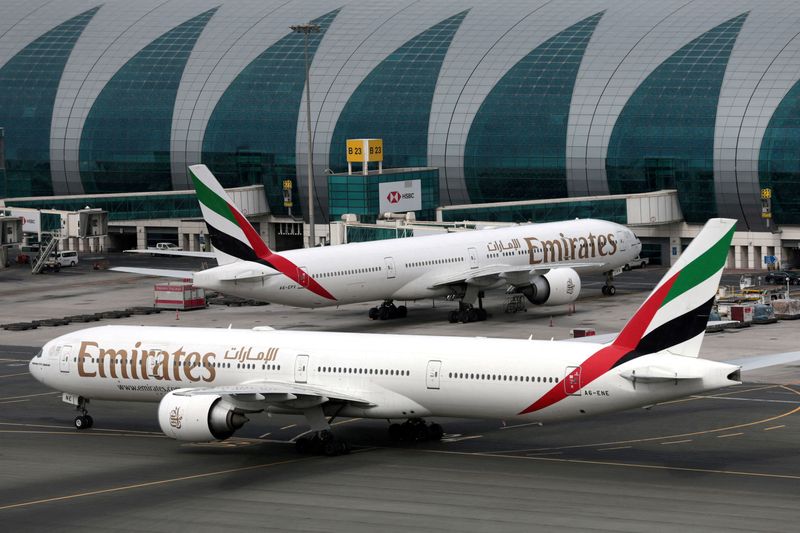

© Reuters. FILE PHOTO: Emirates Airline Boeing 777-300ER planes are seen at Dubai International Airport in Dubai, United Arab Emirates, February 15, 2019. REUTERS/Christopher Pike/File Photo
By Tim Hepher and David Shepardson
(Reuters) – Major international airlines rushed to rejig or cancel flights to the United States ahead of a 5G wireless rollout on Wednesday that has triggered safety concerns, despite two wireless carriers saying they will delay parts of the deployment.
The Federal Aviation Administration (FAA) had warned that potential 5G interference could affect height readings that play a key role in bad-weather landings on some jets and airlines say the Boeing (NYSE:) 777 is among models initially in the spotlight.
Despite an announcement by AT&T (NYSE:) and Verizon (NYSE:) that they would pause the 5G rollout near airports, several airlines still canceled flights or switched aircraft models.
Late Tuesday, the FAA began updating its guidance on which airports and aircraft models would be affected, in a move expected to dramatically lessen the impact of the nearly 1,500 notices of 5G restrictions issued by the regulator.
The world’s largest operator of the Boeing 777, Dubai’s Emirates, said earlier it would suspend flights to nine U.S. destinations from Jan. 19, the planned date for the deployment of 5G wireless services.
Emirates flights to New York’s JFK, Los Angeles and Washington DC will continue to operate.
Japan’s two major airlines, All Nippon Airways and Japan Airlines, said they would curtail Boeing 777 flights. ANA said it was cancelling or changing the aircraft used on some U.S. flights.
Korean Air Lines said it had switched away from 777s and 747-8s on six U.S. passenger and cargo flights, Taiwan’s China Airlines said it would reschedule some flights and Hong Kong’s Cathay Pacific Airways (OTC:) said it would deploy different aircraft types if needed.
The airlines said they were acting in response to a notice from Boeing that 5G signals may interfere with the radio altimeter on the 777, leading to restrictions.
A spokesman for Boeing had no immediate comment.
The 777 last year was the second-most used widebody plane on flights to and from U.S. airports with around 210,000 flights, behind only the 767, according to data from FlightRadar24.
Industry sources said Boeing had issued technical advisories noting potential interference, but that flight restrictions were in the hands of the FAA, which has for now limited operations at key airports unless airlines qualify for special approvals.
Radio altimeters give precise readings of the height above the ground on approach and help with automated landings, as well as verifying the jet has landed before allowing reverse thrust.
Air India, which serves four U.S. destinations with Boeing 777s, said those flights would be curtailed or face changes in aircraft type starting from Wednesday.
WORKHORSE JET
The announcement of cancellations came despite the wireless carriers delaying turning on some 5G towers near key airports.
Airline industry sources said the decision had arrived too late to affect complex aircraft and crewing decisions for some Wednesday flights.
British Airways opted to switch aircraft on its daily flight to Los Angeles to an Airbus A380 from the usual Boeing 777 service, two people familiar with the matter told Reuters.
Web tracker Flightradar24 said the A350 may also be used. The radio altimeters on the two Airbus jets have been cleared while the planemaker is still assessing its other models.
The 777 mini-jumbo is a workhorse of the long-haul travel market that remains depressed following COVID-19, while its freighter equivalent has reshaped the aviation route map during the pandemic, according to a spokesperson for Flightradar24.
Not all 777 flights are affected. Emirates, which is also a major user of the larger A380, will switch to the larger aircraft for Los Angeles and New York but keep flying the 777 to Washington, which is not affected.
Qatar Airways, which operates both 777s and A350s to the United States, said all 12 of its U.S. routes were operating as scheduled, with minor delays expected on flights from the U.S. to Doha.